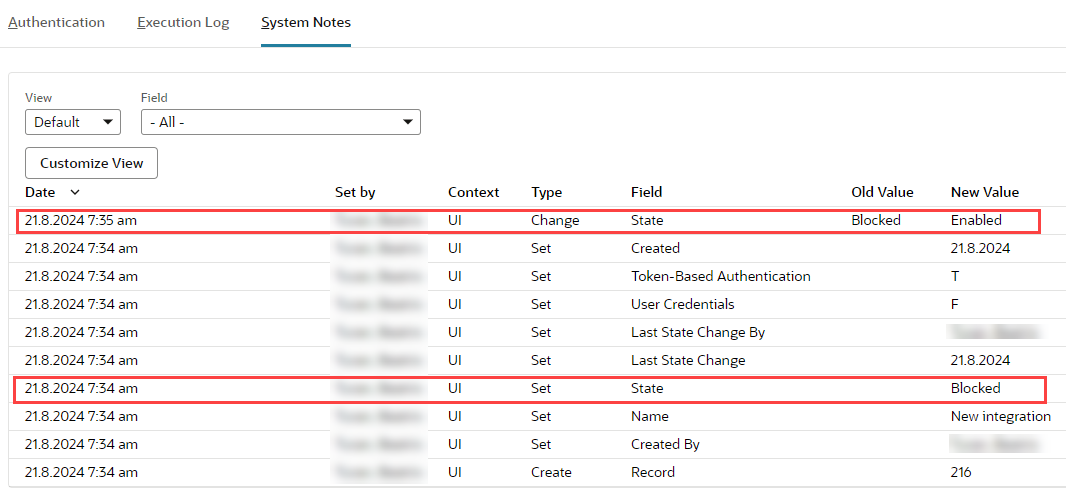Tracking Changes to Integration Records
To review changes to an integration record, check the system notes. System notes track record creation, initial field values, and updates. For instance, changing the State field from Blocked to Enabled is recorded in a system note.
Each event includes details like the user ID and timestamp. System notes also show the previous field value if it was changed.
For more details, see the following topics:
For general details about working with system notes, see System Notes Overview and Searching System Notes.
Finding System Notes for an Integration Record
You can find system notes for integration records in the following ways:
-
By using the System Note search type, at Reports > New Search.
-
By clicking on the System Notes subtab of any integration record.
Special Cases Related to System Notes Logging
System notes for integration records are similar to those for other records. Note that some fields and situations have unique behaviors, as described below:
-
Logging for Records Shared by Sandbox and Production Accounts
-
Notes Are Logged Only for Fields You Have Permission to Modify
Logging for the Last State Change Field
The Last State Change field shows the date of the last change to the State field. State field changes are recorded in the system notes. However, note the following: Multiple same-day State changes only create one system note for the Last State Change field. This is because the field only shows the date, not the time.
You can track State change details, including times, using system notes for the State and Last State Change by fields. Each system note includes a date and time.
Logging for the State Field
Creating an integration record with the default Enabled State logs two system notes: One note shows the initial Blocked value. Another note with the same timestamp shows the change to Enabled.

In contrast, auto-installation or bundling only logs one event for the State field. This note shows the State field value at the time of installation.
Logging for the Reset Credentials Button
You may need to reset the consumer key and secret for an integration record with Token-based Authentication. To regenerate these values,, edit the record and click Reset Credentials. This action is logged in the system notes as a Token-Based Authentication Credentials field update. The system notes show a new value of Reset Credentials.

Credentials are not shown in system notes. Credentials are only shown one time, when first created.
Generation of an Application ID Is Not logged
Creating a new integration record generates an application ID. The application ID isn't listed in system notes when the record is saved. System notes don't indicate the field was set.
You can find the application ID on the record and in the list view, but only authorized users in the owning account can see it. Treat application IDs as confidential, even though they're not authentication credentials.
Logging for Records Shared by Sandbox and Production Accounts
An integration record can exist in both production and sandbox accounts. For instance, you can create a record in sandbox and install it in production. In many cases, the record is editable in both accounts. (For details on when this is possible, see Using Integration Records in Sandbox Accounts.) Note that system notes are only created in the account where changes are made, even if changes are propagated to other accounts.
Notes Are Logged Only for Fields You Have Permission to Modify
In general, system notes are only created for fields you can edit. The owning account's record has more system notes because it includes notes for all fields.
This difference is noticeable when the account owner changes fields that others can't edit. Updates are propagated to all accounts, but system notes are only created in the owning account.
Learn how ownership affects system notes for different fields in the following table.
|
Field |
Notes |
|---|---|
|
Created By |
A system note is created for the Created By field when a record is created or installed. The field is populated differently in the following ways: In the creating account, the field shows the creator's identity. If the record was installed, the field shows the installer's identity. |
|
Description |
Description field system notes only exist in the owner's account, despite changes being pushed to other accounts. |
|
Name |
A system note is created for the Name field in the installing account, even though it can't be edited. The Name field is unique because it has a system note in non-owning accounts, despite being non-editable. Note that changes to the Name field by the owner aren't propagated to other accounts, even if a bundle update shows the new name. |
|
Note |
The Note field data is specific to the installing account. Therefore, the Note field isn't set during installation, and no system note is created at that time. Adding a value to the Note field after installation creates a system note. |
|
Token-based Authentication |
Token-based Authentication field system notes only exist in the owner's account, despite changes being pushed to other accounts. |
|
User Credentials |
User Credentials field system notes only exist in the owner's account, despite changes being pushed to other accounts. |
Related Topics
- Integration Management
- Integration Record Overview
- Adding an Integration Record
- Application Details for Client Code
- Blocking SOAP Web Services Requests
- SOAP Web Services Execution Log
- Distributing Integration Records
- Default Web Services Integrations Record
- Using Integration Records in Sandbox Accounts
- Token-based Authentication Credentials and Accounts
- Using Integration Records in Conjunction With SSO Calls
- Removing Integration Records